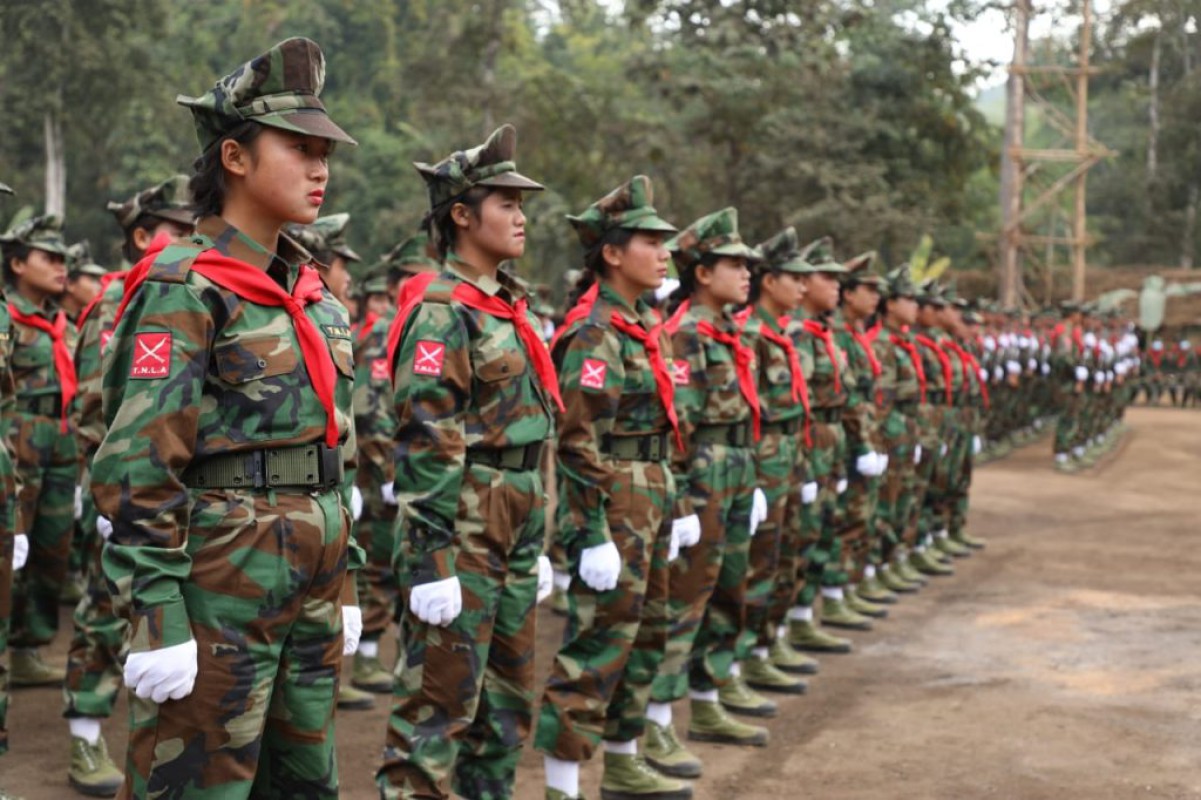Questionable revolution of ethnic armed groups : Featuring the TNLA

540

By Phyo Lin Aung (NP News) – Feb 18
Recently, Shan civil society groups have issued a statement calling on the Ta'ang National Liberation Army (TNLA) to restore the original entrance landmark of Hsipaw. The statement notes that on February 7, the TNLA altered the entrance landmark in Hsipaw Township, located in northern Shan State. The group replaced the original design, which featured the Shan State flag and the Shan language, with the Ta'ang (Palaung) national flag and colours. They also removed the original inscription written in Shan script.
According to the 2014 census, Hsipaw Township had a Shan population of 135,363, making up 79.89 percent of the total population. The area is home to various ethnic groups, including Bamar, Palaung (Ta'ang), and Lisu, who have historically coexisted peacefully. Shan civil society organizations emphasized that these diverse groups, particularly the Shan majority, have lived in harmony since the time of the ancient Shan rulers.
The statement condemned the TNLA for unilaterally changing the entrance landmark to represent only one ethnic group, without taking into account the feelings of the local population. The organizations questioned whether this action was part of an expansionist agenda and an attempt to impose ethnic dominance. They emphasized that such actions might fuel ethnic divisions, provoke resentment, and further exacerbate tensions between the Ta'ang and other ethnic communities.
On September 2, 2024, the Anti-Terrorism Central Committee of the State Administration Council (SAC) officially designated the TNLA, along with the Myanmar National Democratic Alliance Army (MNDAA) and the Arakan Army (AA), as terrorist organizations. This designation followed these groups' involvement in operation 1027, a series of coordinated acts against the Tamadaw, which has also been described as a form of territorial insurgency.
As of now, the TNLA has successfully seized control of 12 towns in Shan State, further consolidating their influence in the region. In these territories, the group has been accused of exploiting natural resources to fund their operations.
Since the TNLA seized control of Mogok, a major gemstone-producing region in Myanmar, the group has reportedly been collaborating with Wa groups to extract millions of dollars' worth of precious stones over an extended period. The large-scale extraction of these gemstones has led to considerable financial losses for the government’s national treasury. The precious stones are believed to be smuggled out of the country through hidden routes, bypassing government authorities and contributing to the informal economy. The proceeds from these illegal activities are likely being used to strengthen the armed groups' weaponry, facilitating their continued insurgency against the government.
Furthermore, the TNLA appears to prioritize their own ethnic identity over that of other groups in the territories they control. For instance, they have forcibly ordered local residents to display the Palaung flag in observance of the Palaung National Revolution Day, which falls on January 12. Failure to comply with this directive has led to penalties, including fines and imprisonment for up to one month. This policy affects all residents in the controlled areas, even though they are not all Palaung, creating a sense of ethnic imposition.
It has been reported that discrimination is on the rise in regions controlled by the TNLA, largely due to the implementation of their "Palaung First" policy. As part of this initiative, the TNLA has introduced Palaung literature as a subject in schools within their controlled areas in Shan State. Additionally, it has been reported that local administrative positions are being exclusively filled by Palaung individuals.
These actions have sparked growing discontent among the local population, which includes not only Palaung, but also other ethnic groups. The emphasis on prioritizing one ethnic group over others is creating a sense of unfairness and deepening divisions between the communities in the region. These policies have raised concerns about the long-term social stability in these areas.
Furthermore, the TNLA has reportedly violated human rights. Since November 2024, the group has been forcibly recruiting youths and civilians into its military in Hsipaw and Kyaukme Townships. On January 5, 2025, the TNLA allegedly arrested local villagers in San Pheik village, Hsipaw Township, for using mobile phones. These actions have raised serious concerns about the group's treatment of local populations and its disregard for basic freedoms.
If I speak plainly, the revolutionary journey of ethnic armed groups is increasingly pursuing personal gain rather than the fight for true self-governance. Once they control their territories, they exploit those lands for profit, prioritizing the sale of natural resources and securing personal wealth over the well-being of the broader community. With autonomy, they manage affairs in a way that often serves their own interests. Over time, this leads to the emergence of ethnocentric elites who view the land and its people as tools for their own advancement. This represents the extreme path that many ethnic armed groups are following, focusing more on self-interest than on achieving true liberation for their people. –